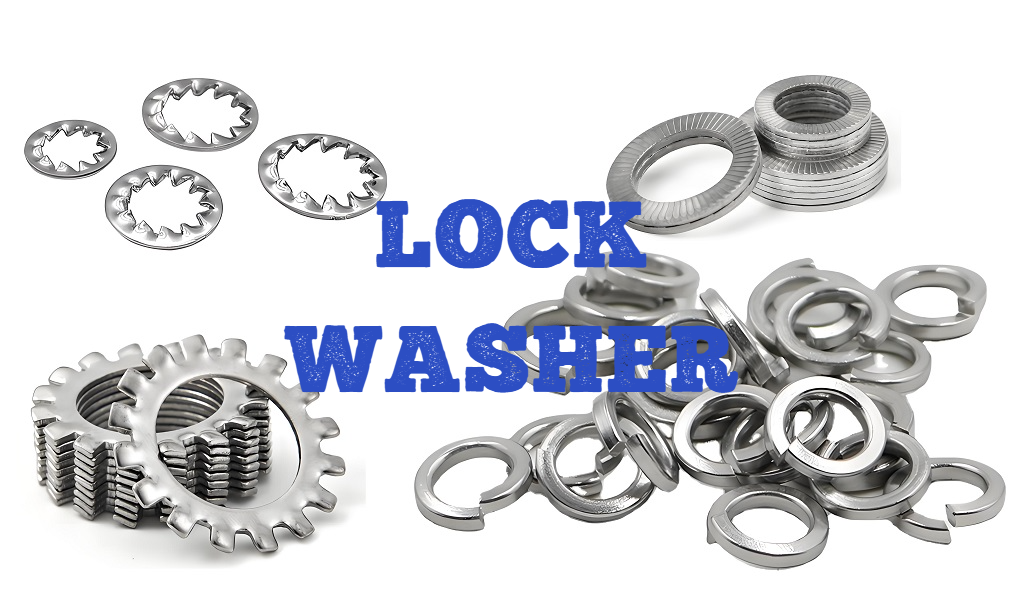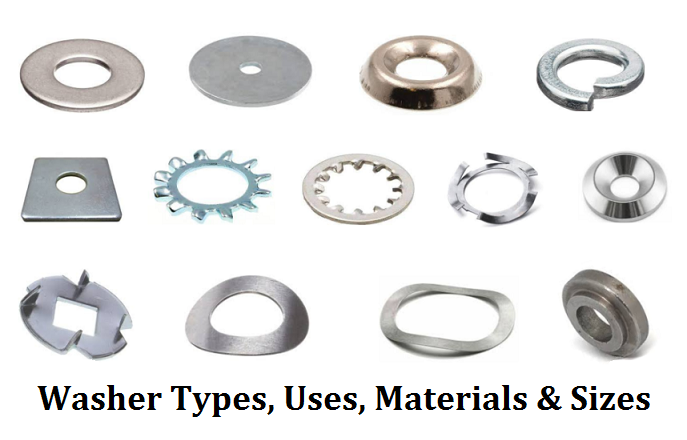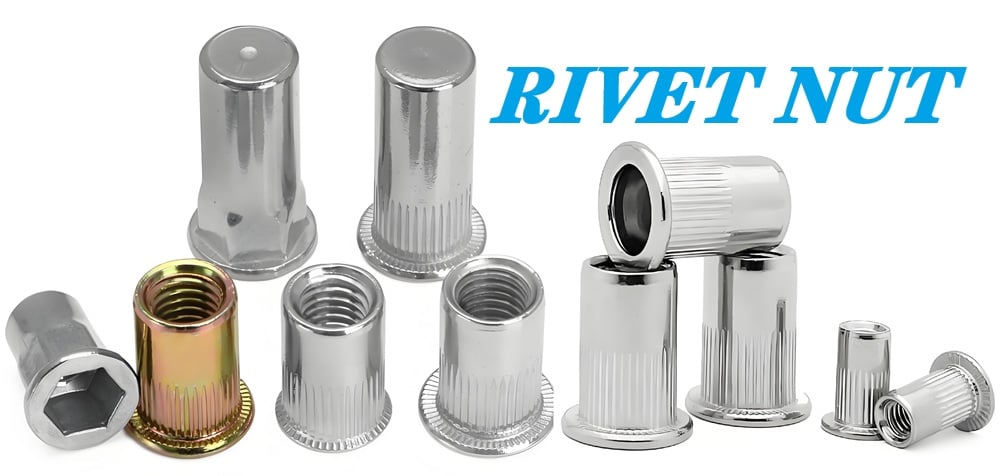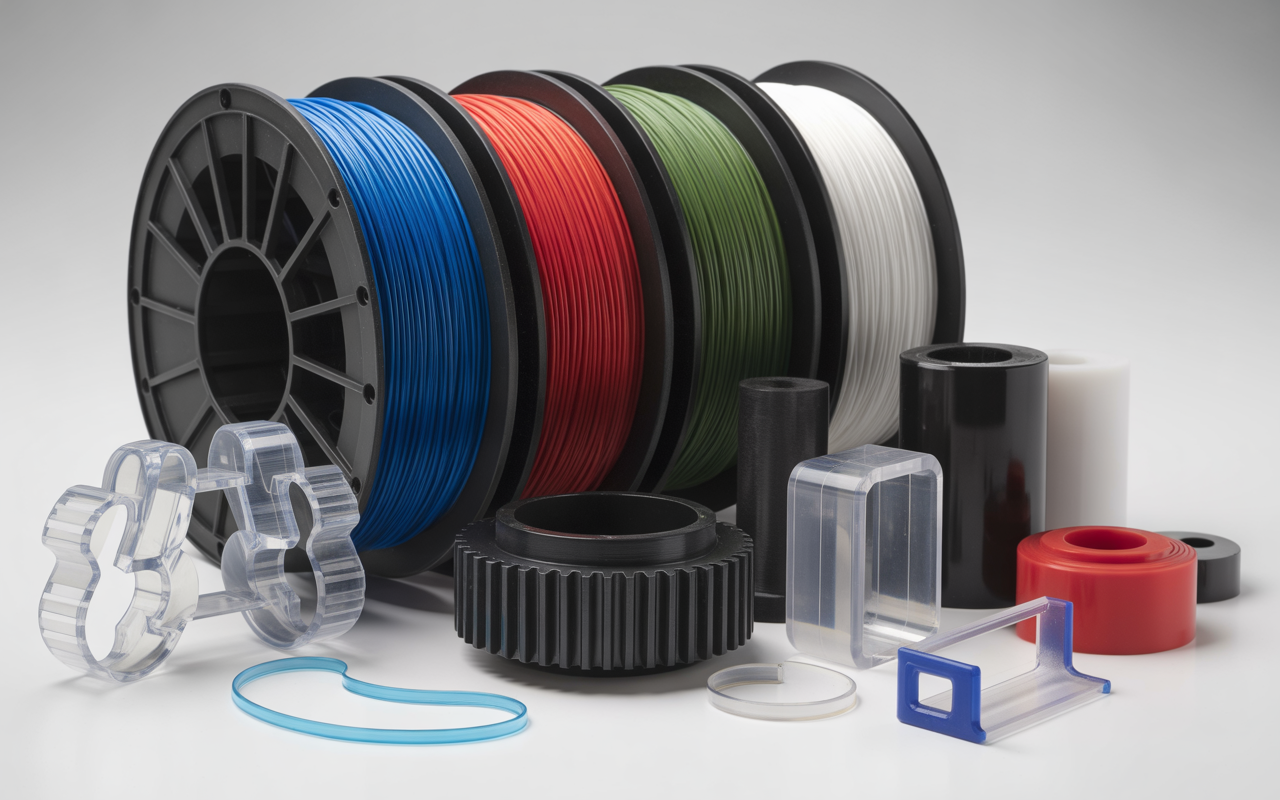Choosing the right fastener to secure bolts and prevent loosening caused by vibration or load is an important decision in many projects. Split lock washers and nylon lock nuts are widely used options, each with its own design, purpose, and advantages. Today, we compare these two fasteners, focusing on how they work, where or when they are used, and how to use them, so you can make an informed choice for your specific needs.
1. What Is a Split Lock Washer?
A split lock washer is a type of washer designed with a cut across the ring and a twisted shape, resembling a spring. This unique design allows it to apply tension to a fastener, helping to secure nuts and bolts in place. So split lock washer is also known as a type of Spring Lock Washer, and is commonly used in combination with flat washers to prevent loosening and potential damage to the mating surface.
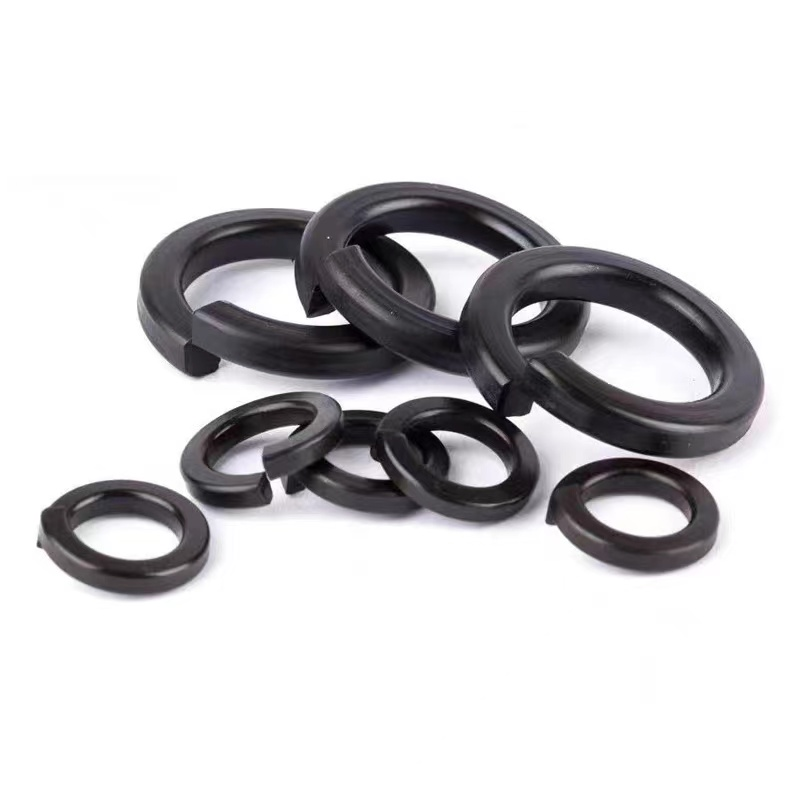
The washer works by utilizing the elasticity of the deformed metal, which attempts to return to its original shape after being compressed. This spring-like property makes it highly effective for preventing nuts and bolts from loosening due to vibration or load changes.
Pros & Cons of Split Lock Washer
| Pros | Cons |
|---|---|
| Prevents loosening under vibration | Limited effectiveness in high-load applications |
| Improves fastener stability | Can damage softer materials |
| Easy and compact to use | Less reliable under extreme torque |
| Cost-effective solution | Prone to corrosion if not treated |
| Versatile across various applications | May lose tension over time |
| Absorbs stress and reduces damage | Requires careful installation |
| Helps prevent leaks in some scenarios | Not ideal for high-strength bolts |
Best Use Cases of Split Lock Washer
- High Torque Applications: Split lock washers are ideal for setups requiring significant tightening force, as they can handle the stress of high torque.
- Heat and Vibration Environments: Common in industries like automotive (e.g., mufflers) and machinery, where components are exposed to constant movement and temperature changes.
- Sealing Connections: Their elasticity can help seal joints, preventing moisture or fluid leaks in systems like pipelines or hydraulic systems.
- Reusability
Although nylon lock nuts can be reused a few times, their locking capability diminishes with repeated use, especially if the nylon insert is deformed.
How Does a Split Lock Washer Work?
The primary purpose of a split lock washer is to prevent fasteners from loosening under vibration or dynamic loads. When installed, the washer flattens as the nut or bolt is tightened, creating a spring force that applies continuous pressure on the fastener. This tension increases friction, which helps to keep the fastener in place.
In addition to its locking capabilities, the serrated edges of some split lock washers dig into the mating surface or the fastener, further increasing friction. This design reduces the likelihood of the connection loosening and minimizes the risk of downtime, maintenance, or equipment failure.
For example, in machinery or automotive applications, where vibration is common, the use of split lock washers ensures stable connections and prevents costly interruptions.
How to Use a Split Lock Washer?
Proper installation is key to ensuring the effectiveness of split lock washers. Follow these steps:
Positioning
Place the split lock washer between the flat washer (if used) and the nut or bolt head. The split side of the washer should face downward toward the mating surface.
Tightening
As you tighten the nut or bolt, the washer will compress and flatten. This creates tension and increases friction, helping to lock the fastener in place.
Combination with Flat Washers
For softer materials or surfaces that may be damaged by the serrated edges, use a flat washer in combination with the split lock washer. This setup distributes the load more evenly and prevents surface damage.
Proper torque is essential when installing split lock washers. Over-tightening can damage the washer or the connection, while under-tightening may reduce its locking effectiveness.
What Is a Split Lock Washer Used For?
Split lock washers are versatile and used across a wide range of industries and applications, including:
Machinery and Equipment
In industrial machinery, split lock washers help maintain stable connections in high-vibration environments, preventing nuts and bolts from loosening.
Automotive Applications
Cars, trucks, and other vehicles often rely on split lock washers in areas such as engine compartments and suspension systems to secure fasteners under dynamic loads.
Hydraulic and Pipe Connections
The sealing properties of split lock washers make them effective in preventing leaks in hydraulic systems or water pipe connections.
Steel Structures
In construction, split lock washers are used in steel structures such as bridges and buildings to reduce stress concentration and prevent stress corrosion cracking.
Household Repairs
Split lock washers are also used in everyday applications like furniture assembly, appliances, and DIY projects to keep screws and bolts secure.
2. What Is a Nylon Lock Nut?
A nylon lock nut is a specialized type of nut that features a nylon insert designed to secure fasteners and prevent them from loosening. This nylon ring, located inside the nut, increases friction between the nut and the bolt threads, ensuring a tight and stable connection.
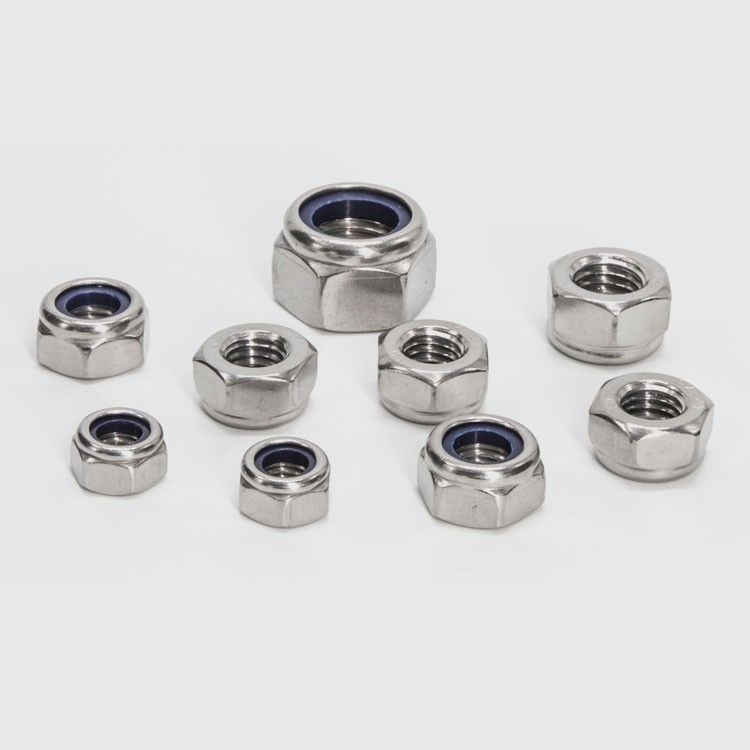
There are two primary structural types of nylon lock nuts:
- Those with the nylon ring embedded inside the nut.
- Those with the nylon ring wrapped around the outside.
Both designs work on the same principle but differ in their structure. Nylon lock nuts are also referred to as “nylon-insert lock nuts” or simply “nyloc nuts.”
Pros & Cons of Nylon Lock Nuts
| Pros | Cons |
|---|---|
| Prevents fasteners from loosening due to vibrations or rotation. | Must be replaced after removal as the nylon insert loses effectiveness. |
| Dampens vibrations, keeping connections secure. | Not suitable for environments above 121°C (250°F). |
| Simple to use without specialized tools. | Limited to light or medium load applications. |
| Works with various materials like metal, plastic, and composites. | Can seize onto bolts if over-tightened or installed without lubrication. |
| Durable in harsh environments and resistant to many chemicals. | Prolonged exposure to UV light or chemicals can weaken the nylon insert. |
| Provides insulation, suitable for electronic applications. | Loses locking ability after repeated use. |
Best Uses of Nylon Loc Nuts
- Light-Duty Applications: Ideal for situations requiring secure fastening but without extreme torque, such as light fixtures or furniture assembly.
- Permanent Installations: Often used when frequent disassembly isn’t necessary, as repeated use can reduce their locking effectiveness.
- Moisture and Corrosion Resistance: Suitable for environments where exposure to liquids or chemicals is a concern.
- Reusability
Although nylon lock nuts can be reused a few times, their locking capability diminishes with repeated use, especially if the nylon insert is deformed.
How Does a Nylon Lock Nut Work?
The primary function of a nylon lock nut is to prevent fasteners from loosening due to vibration or dynamic loads. When the nut is tightened onto a bolt, the nylon insert compresses and deforms, creating a tight grip on the threads.
This compression generates friction and resists loosening caused by vibrations or rotational forces. The nylon insert offers both axial and radial deformation, locking the bolt in place. Additionally, the nylon material provides vibration resistance, making it ideal for dynamic environments.
For example, in automotive applications, nylon lock nuts are used to secure components like engines and steering wheels, where vibration resistance is essential.
How to Use & Tighten Nylon Lock Nut?
Using nylon lock nuts correctly ensures their effectiveness in securing fasteners. Below is a step-by-step guide and precautions to follow during installation:
Step 1 – Select the Correct Size
Ensure the nylon lock nut matches the bolt or screw size to achieve a secure and reliable connection.
Step 2 – Start by Hand-Tightening
Thread the nylon lock nut onto the bolt by hand until you feel resistance. This resistance occurs as the bolt threads engage with the nylon insert.
Step 3 – Tighten with a Tool
Use a wrench or spanner to tighten the nut further. Typically, turn the nut an additional 90° to 180°, depending on the specifications and application.
Step 5 – Check the Connection
Once tightened, inspect the connection to ensure the nut is securely fastened. Proper engagement of the nylon insert is key to preventing loosening.
Precautions to Follow
- Single-Use Only – Nylon lock nuts lose their locking ability after the first use. Always replace the nut with a new one if it has been removed.
- Avoid Over-Tightening – Excessive force can deform the nylon insert, reducing its locking ability. Tighten only to the recommended torque to maintain effectiveness.
- Do Not Use Power Tools – Power tools can damage the nylon insert and threads due to excessive speed or force. Always tighten manually for better control.
- Monitor the Ambient Temperature – Nylon lock nuts are not suitable for high-temperature environments (above 121°C or 250°F). Heat can soften the nylon insert, compromising its locking ability.
- Not Suitable for Heavy Loads – Use nylon lock nuts for light to medium-load applications. For heavy-duty fastening, consider alternatives like metal lock nuts.
- Avoid Combining with Other Fasteners – Mixing nylon lock nuts with other fastener types can reduce their locking effectiveness due to differing friction properties.
- Check for Resistance – If you encounter significant resistance while tightening, stop and inspect for abnormalities, such as thread damage or misalignment.
What Are Nylon Lock Nuts Used For?
Nylon lock nuts have a broad range of applications across various industries, including:
Mechanical Manufacturing
Common in machinery, molds, and robots, nylon lock nuts ensure reliable fastening and vibration resistance. They are essential for stable machine operation.
Automotive Industry
Used in components like tires, steering wheels, engines, and chassis, nylon lock nuts provide vibration resistance and secure fastening.
Aerospace Applications
In aircraft, nylon lock nuts are used to secure parts while ensuring stability and safety during flight.
Electronics
These nuts are frequently used to secure screws in circuit boards, protecting components from loosening and damage.
Lighting and Household Applications
From streetlights to furniture assembly, nylon lock nuts improve connection stability and prevent loosening.
Lock Washer Definition, Types, Size Chart, Uses | Split vs Wedge vs Tooth Lock Washer
Detailed guide to locking washers, including their definitions, types, size charts, uses, and the differences between split, wedge, and tooth lock washers.
Split Lock Washer vs Nylon Lock Nut, What are the Differences?
Through our detailed introduction to the two fasteners above, you should have a general understanding of the difference between them. So here we want to sort out a clear table highlighting the differences between split lock washers and nylon lock nuts:
| Feature | Split Lock Washer | Nylon Lock Nut |
|---|---|---|
| Structure | A circular washer with a split or notch, creating a spring-like design. | A standard nut with a nylon insert that deforms to grip the bolt threads. |
| Functionality | Prevents loosening by applying spring tension and increasing friction. | Prevents loosening by creating friction through the nylon insert. |
| Best Use Cases | High-torque, high-temperature, and vibration-prone environments (e.g., engines, machinery). | Light to medium-load applications, such as furniture, electronics, or light fixtures. |
| Temperature Tolerance | Ideal for high temperatures, as the material remains stable. | Not suitable for temperatures above 121°C (250°F), as the nylon insert may deform. |
| Reusability | Can often be reused, but its effectiveness may decrease if deformed. | Usually single-use; the nylon insert loses effectiveness after removal. |
| Installation Ease | Simple to install, often used with flat washers for added protection. | Easy to install without any additional components. |
| Vibration Resistance | Handles significant vibrations, maintaining tension effectively. | Provides good vibration resistance for light-duty applications. |
| Load Capacity | Suitable for heavy loads and high-torque applications. | Best for light to medium loads; not ideal for heavy-duty fastening. |
| Corrosion Resistance | Limited resistance unless paired with a corrosion-resistant material or coating. | Resistant to many chemicals, offering durability in harsh environments. |
| Electrical Insulation | None. | Provides electrical insulation due to the nylon insert. |
| Cost | Generally lower cost than nylon lock nuts. | Slightly more expensive due to the nylon insert. |
This table provides a concise comparison, helping you choose the right option for your specific application.
Split Lock Washer vs Nylon Lock Nut, Which is Better To Use?
Determining whether a split lock washer or a nylon lock nut is better depends entirely on the application and working conditions. Here is our suggestion for when you choose each of them:
When is Better to Use Split Lock Washers:
- The application involves high torque or heavy loads.
- The environment has high temperatures or significant vibration.
- You need a reusable option for frequent assembly and disassembly.
When is Better to Use Nylon Lock Nuts:
- The application is light to medium load.
- The environment is free from extreme heat.
- Chemical resistance or electrical insulation is required.
- A simpler, more permanent fastening solution is preferred.


